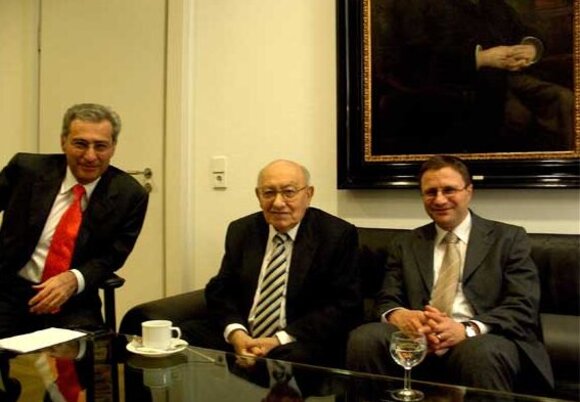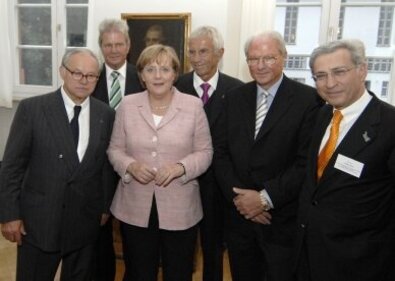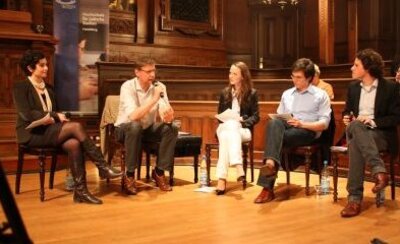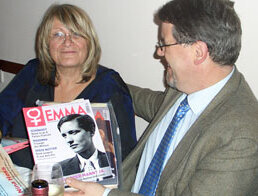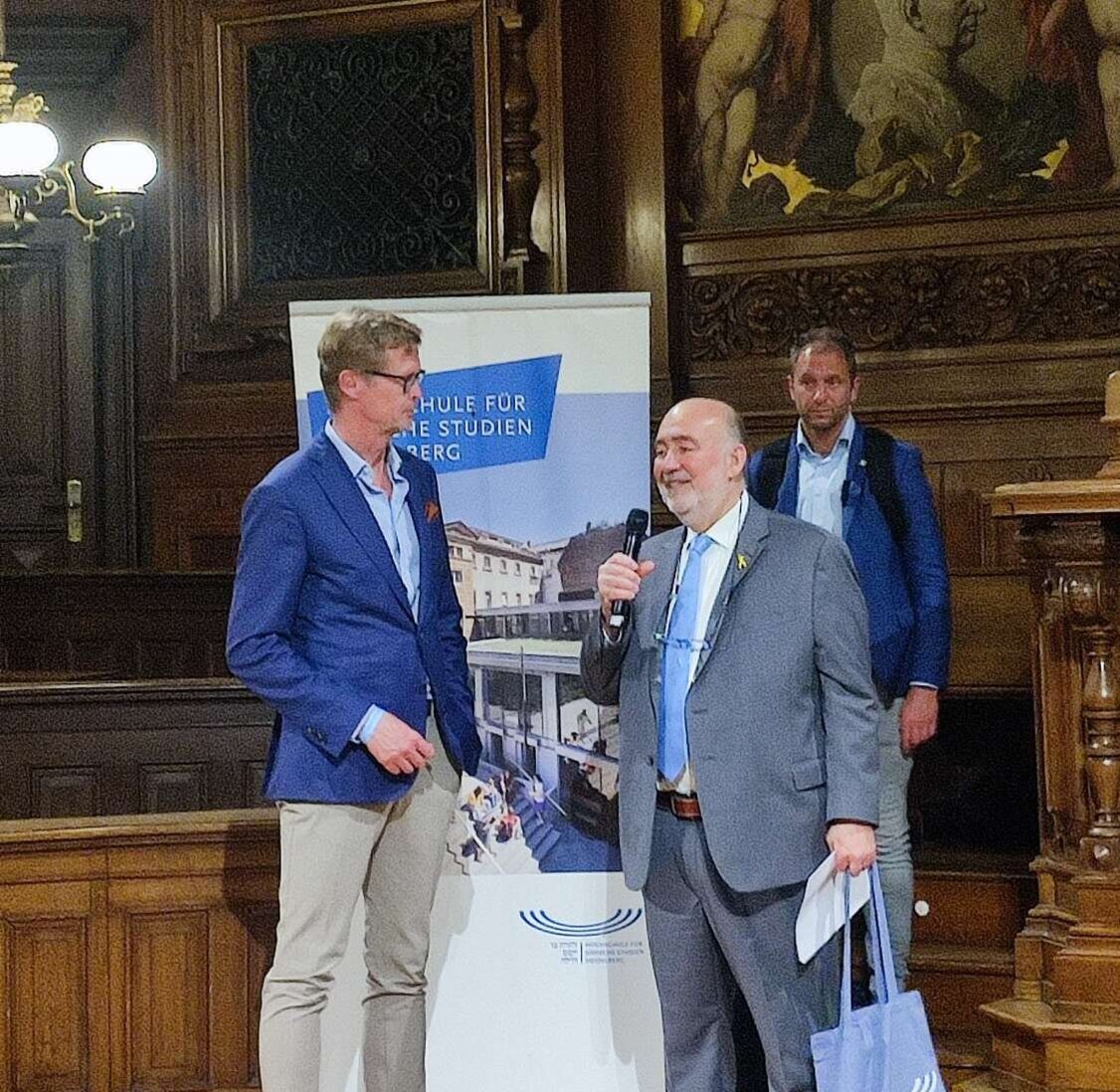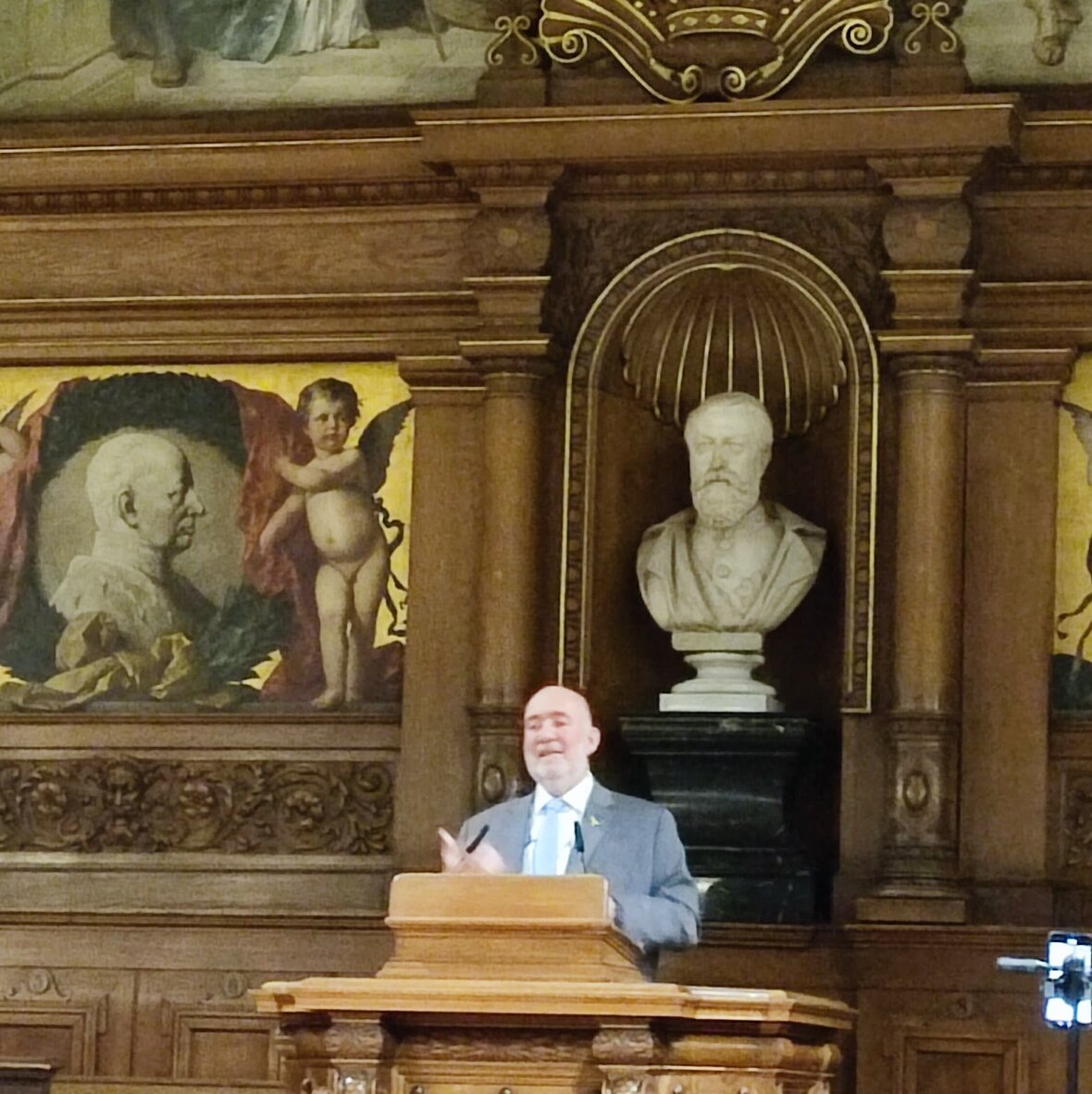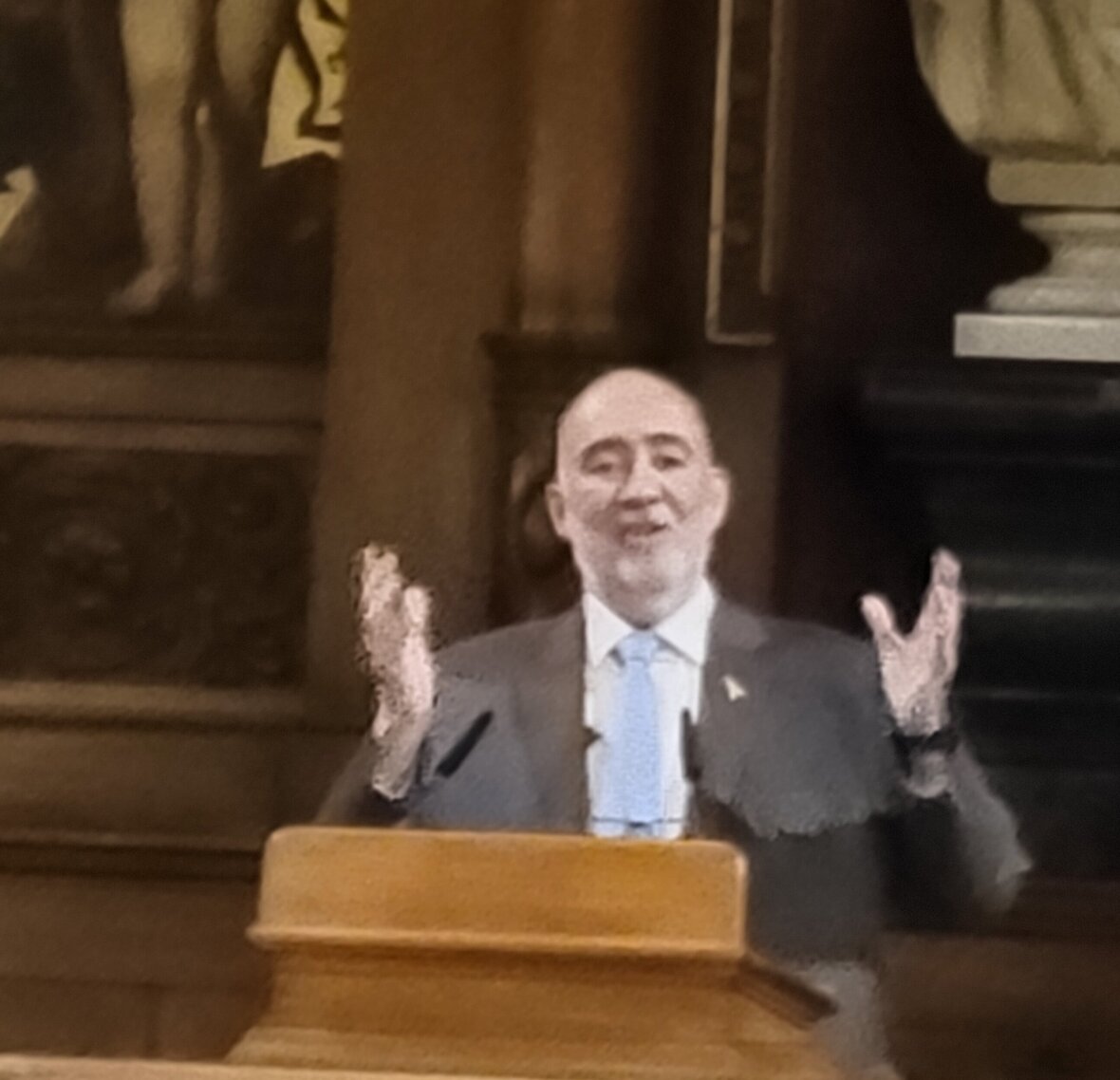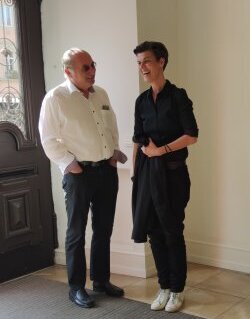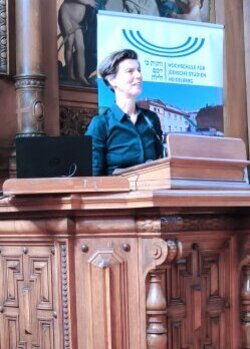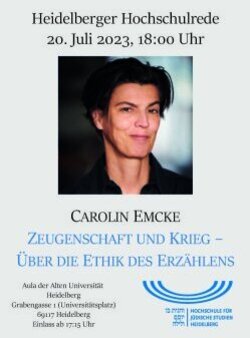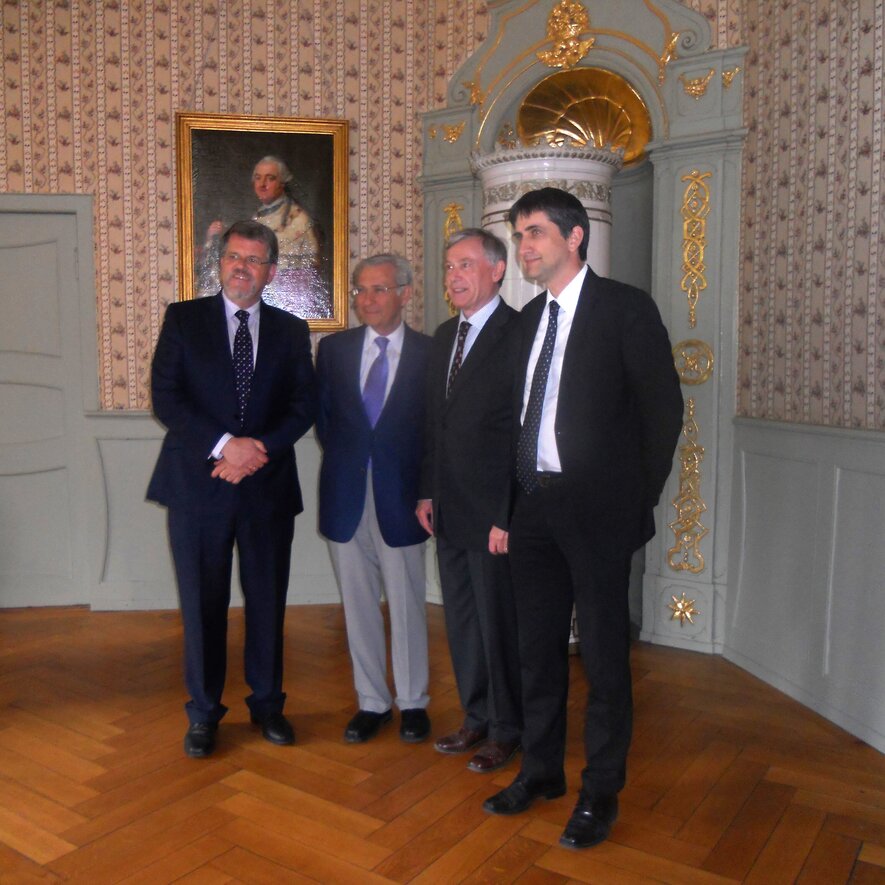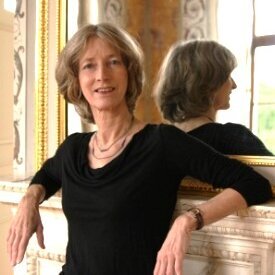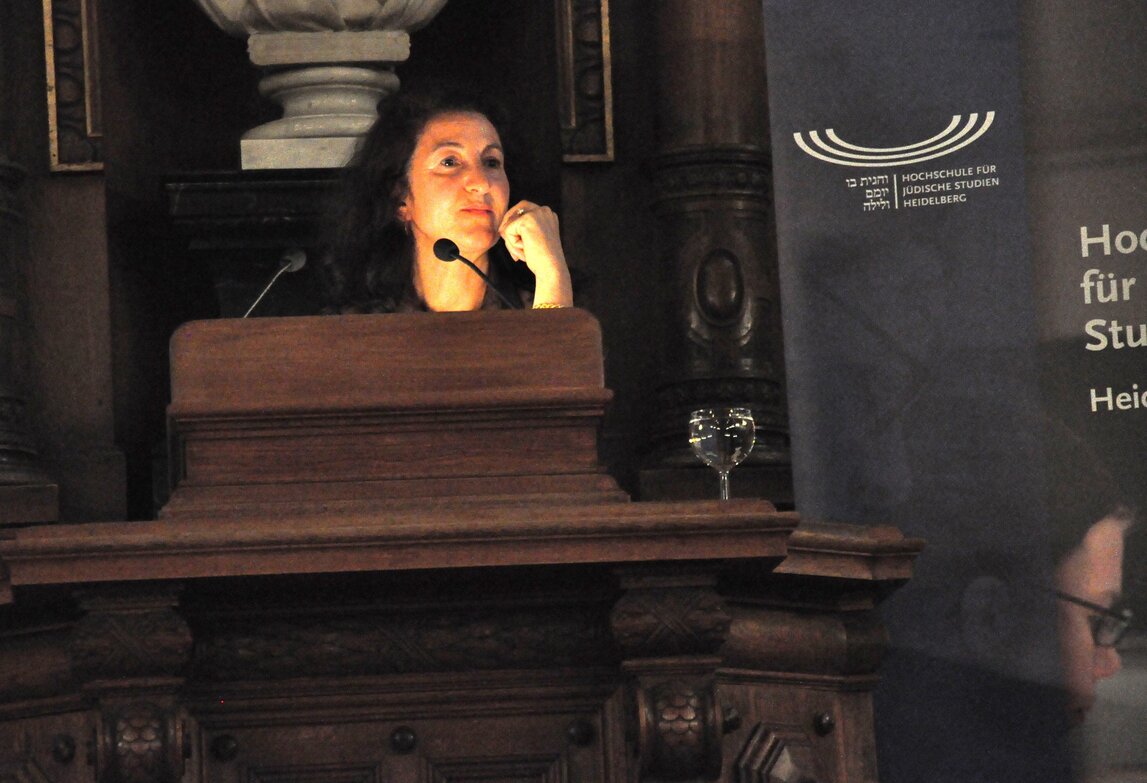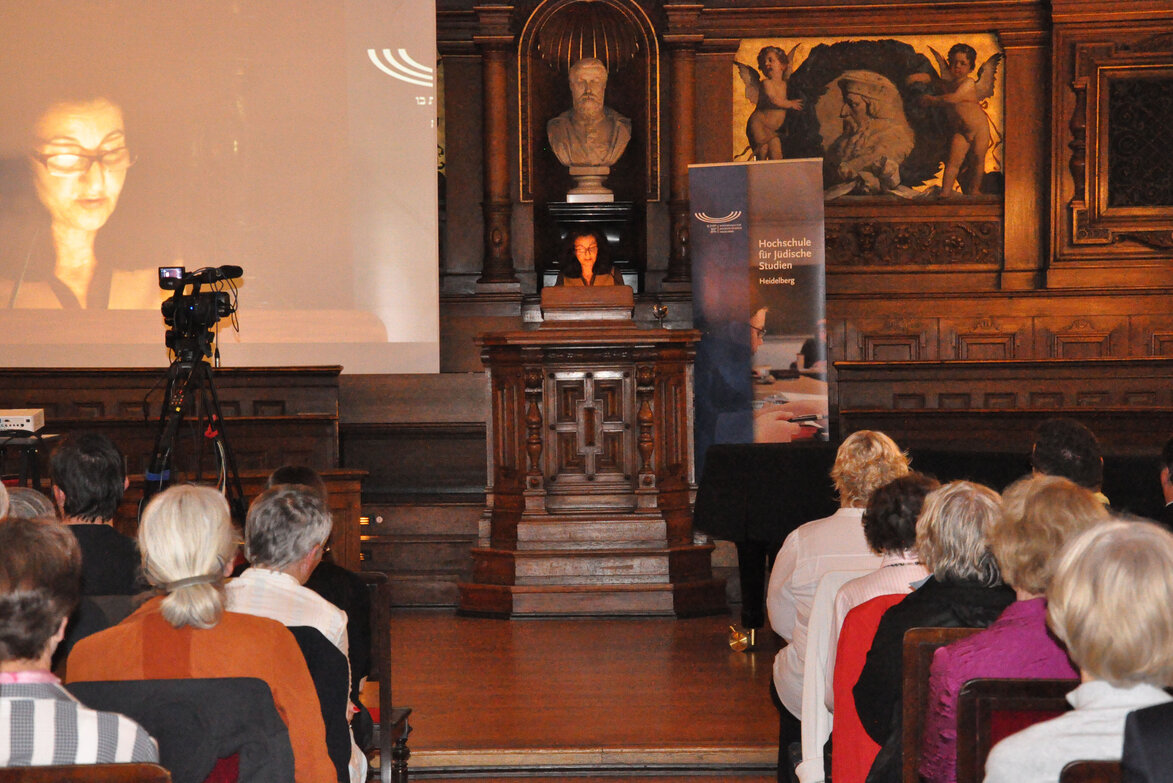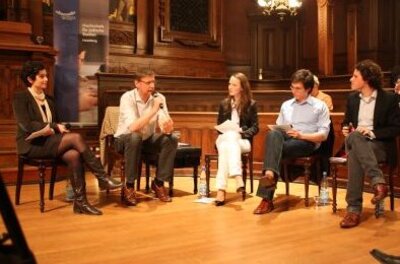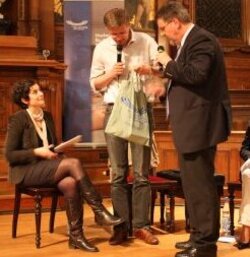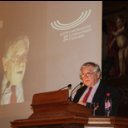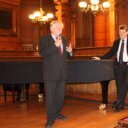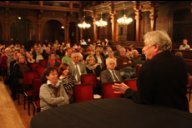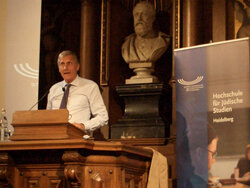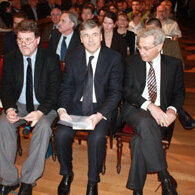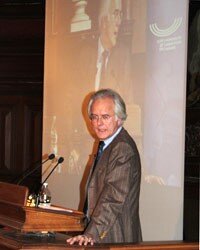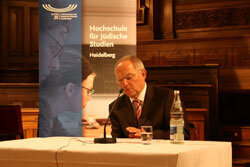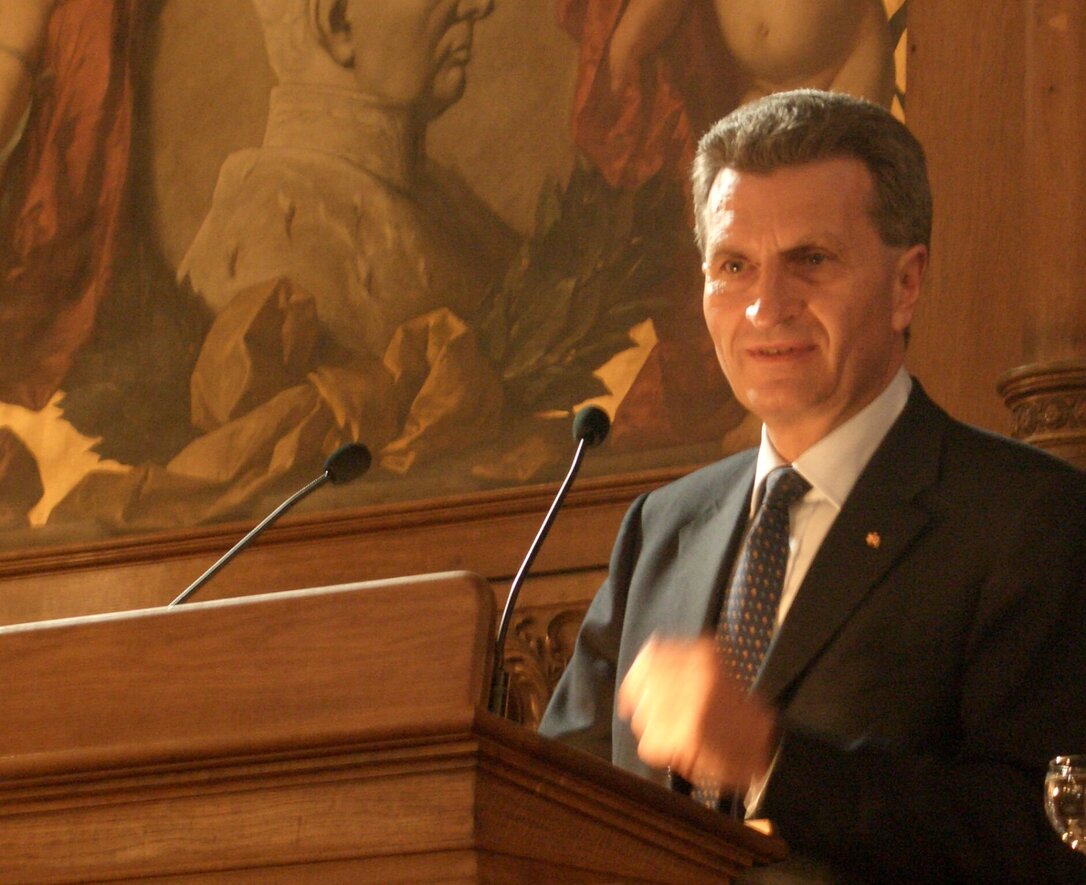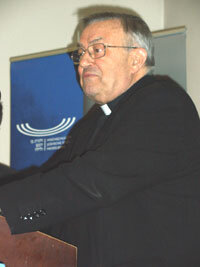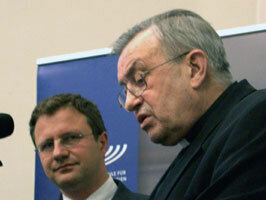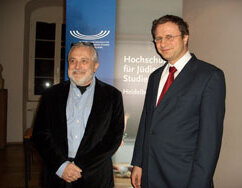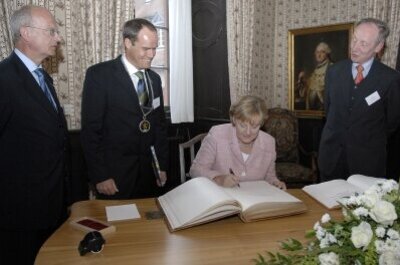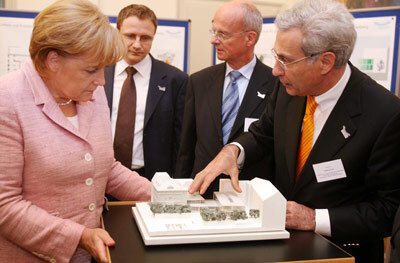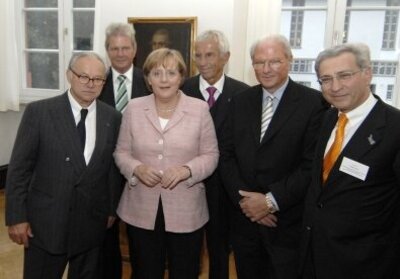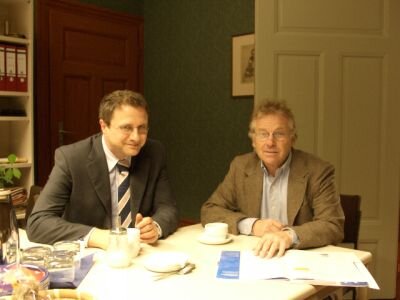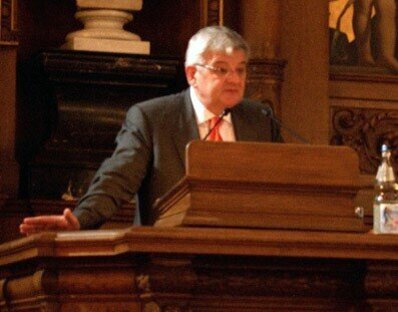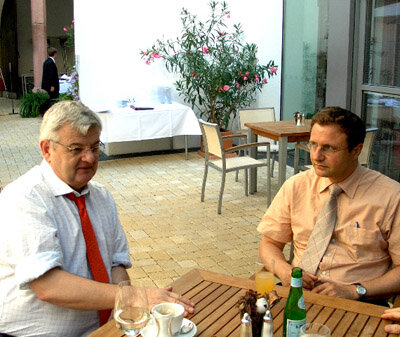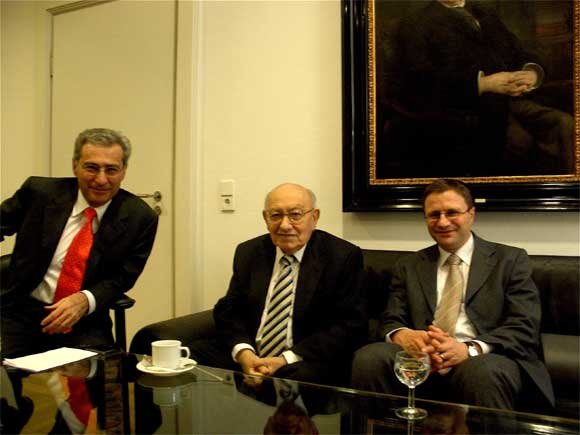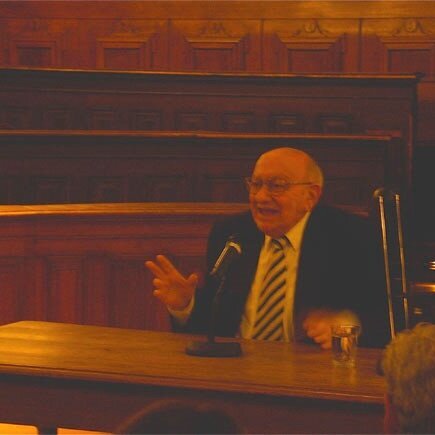History
Milestones of the HfJS
Here you will find Milestones of the Heidelberg University for Jewish Studies from the last five years.
In January, the President of the Federal Constitutional Court, Prof. Dr. Stephan Harbarth, visits the HfJS.
Dr. Andreas Brämer takes office as the new Rector on October 1, 2024. He replaces Prof. Werner Arnold as Rector. The ceremonial farewell and handover of office takes place in December in the presence of the President of the Central Council of Jews in Germany, Dr. Josef Schuster, and the Chair of the Board of Trustees, Prof. Barbara Traub.
In November, Prof. Israel Yuval, Hebrew University of Jerusalem, is awarded the honorary degree of Doctor of Philosophy (Dr. phil. h.c.) in recognition of his groundbreaking academic work on the history of Jewish-Christian relations in late antiquity and the Middle Ages, as well as his outstanding services to Israeli-German academic relations.
Prof. Hanna Liss becomes a full member of the Academy of Sciences and Humanities. Presence of the HfJS in the Great Faculty Council of the Faculty of Philosophy at Heidelberg University.
In addition to Prof. Hanna Liss and Prof. Johannes Heil, Prof. Johannes Becke and Prof. Werner Arnold are now also members of the HfJS.
Professor Dr. Werner Arnold to be the new Rector of the Heidelberg University of Jewish Studies: The University's Board of Trustees and Senate have elected Professor Dr. Werner Arnold, Professor Emeritus of Semitic Studies at the Department of Near Eastern Languages and Cultures at Heidelberg University, to head the university.
He will succeed Professor Dr. Johannes Heil for a term of two years from October 1, 2020.
Milestones from the founding year 1979 to 2019 can be found under Milestones of HfJS 1979-2019.
Rectors of HfJS
- Since 2024 Dr. Andreas Brämer
- 2020-2024 Professor Dr. Werner Arnold
- 2019-2020 Professor Dr. Johannes Heil, Acting Rector
- 2013-2019 Professor Dr. Johannes Heil
- 2008-2013 Professor Dr. Johannes Heil, First Vice-Rector
- 2005-2008 Professor Dr. Alfred Bodenheimer
- 2002-2005 Professor Dr. Manfred Oeming, Vice-Rector
- 1997-2005 Professor Dr. Michael Graetz
- 1989-1997 Professor Dr. Julius Carlebach
- 1986-1988 Professor Dr. Gisbert Freiherr zu Putlitz & Prof. Dr. Gerhard Rau
- 1984-1986 Professor Dr. Mosche Elat
- 1984 Professor Dr. Benjamin Kedar, Acting Rector
- 1982-1984 Professor Dr. Shmaryahu Talmon, 2nd Founding Rector
- 1981-1982 Professor Dr. Abraham Wasserstein, Acting Director
- 1979-1981 Professor Dr. Leon A. Feldmann, 1st Founding Rector
Heidelberg University Lectures
The lecture series of the Heidelberg University of Jewish Studies at Ruprecht-Karls-Universität regularly gives national and international leaders the opportunity to speak on issues of public interest. With this series, the university aims to set an academic and cultural example for the Jewish community in Germany and beyond.
Under the motto "Society in Transition", the lecture series of the Heidelberg University of Jewish Studies discusses current future issues that affect everyone - such as social developments, current debates or structural challenges facing European societies.
Prof. Dr. Salomon Korn, Vice President of the Central Council of Jews in Germany and Chairman of the Board of Trustees of the HfJS, initiated the series in 2005.
Starting with an appearance by Marcel Reich-Ranicki in the Alte Aula of Heidelberg University, a large number of high-ranking speakers, including German Chancellor Dr. Angela Merkel, have since been invited to take part.
On November 6, we warmly welcomed Israeli Ambassador Ron Prosor to the second Heidelberg University Lecture in 2024.
The speech, which he gave in the Alte Aula of Heidelberg University, was entitled The New Middle East and dealt with the atrocities of October 7, 2023, as well as the (inter)national reactions to the massacres and Israel's military deployment in return.
Prosor also gave an assessment of the political and economic developments in the region.
Following Prosor's speech, the audience had the opportunity to ask the Israeli ambassador questions.
The first Heidelberg University Lecture 2024 took place in the summer. Not even a year had passed since the HAMAS massacre in southern Israel on October 7, 2023, and hostages were still being held by the terrorists. Philipp Peyman Engel, editor-in-chief of the Jüdische Allgemeine, was invited to this event. In his speech, he talked about what concerns him, how he feels personally and as editor-in-chief of the major Jewish newspaper, what fears he has, but also what hope he still has - despite everything.
25.April 2018, 6 p.m
What is anti-Semitism and why is it particularly important to combat it?
This was the title of the speech of Dr. Michael Blume StM, Anti-Semitism Commissioner of the State of Baden-Württemberg,
who gave his inaugural speech in Heidelberg as part of the Heidelberg University Lectures on April 25, 2018.
8. February 2017
Ernst Stehl
Vice President of the Federal Office for the Protection of the Constitution
Security in Freedom - Foundations for Germany's Future in a Globalized World
As part of the Heidelberg University Lectures, Ernst Stehl, Vice President of the Federal Office for the Protection of the Constitution, will describe the current state of the national and international security situation from the perspective of the domestic intelligence service. He will be guided by the question of the extent to which the classic security policy distinction between internal and external security is still meaningful or applicable today in the wake of globalization and digitalization.
With a view to German security interests, Vice President Stehl will touch on examples of current potential threats: Islamist terrorism, political extremism, migration and the new dangers from cyberspace. On the one hand, Ernst Stehl wants to use his speech to underline the fact that the challenges of the globalized world cannot be overcome without robust security for citizens. On the other hand, the purpose and function of the Federal Office for the Protection of the Constitution within the German security architecture will be reflected upon.
9. June 2016
Martin Schulz
President of the European Parliament
Homeland, Flight and Identity in Times of Globalization
The refugee issue is currently at the center of discussions not only in Europe, but worldwide, and poses major challenges for politics and societies. What do the terms homeland and identity mean at a time when - according to the UNHCR - around 60 million people worldwide are on the run and migration issues have become global affairs? Martin Schulz, President of the European Parliament, explained what he thinks about this as part of the Heidelberg University Lectures.
17. June 2015
Claus Kleber
Journalist and first presenter of the ZDF heute journal
Disappointments and Irritations - is America becoming a Foreign Friend?
Germany and the United States of America share a long friendship that has grown steadily over the past decades through shared experiences, values and interests. America has long been the superpower for Germany, which provided important assistance after the Second World War and without which - as the guarantor of freedom during the decades of the Cold War - reunification in peace would not have been possible.
At present, the German-American friendship appears to be in crisis: Following the war in Iraq, the NSA affair, among other things, has led to irritations that are severely straining German-American relations. Since the wiretapping scandal, the concept of friendship has come under scrutiny and the common ground is in danger of being lost from view. The TTIP transatlantic trade agreement is currently causing controversy and is strongly characterized by mutual mistrust.
What is the state of German-American relations? ZDF presenter Claus Kleber spoke about this at the Heidelberg University Lectures 2015.
18. November 2015
Gregor Gysi
Chairman of the Left Party parliamentary group in the Bundestag until October 12, 2015
The Difficult Fight against Anti-Semitism - what could a Middle East Solution look like?
Without modern anti-Semitism since the 19th century, Israel might never have existed. Israel's conflict, especially with the Palestinians, is also activating existing anti-Semitic resentment in Europe. A fight against anti-Semitism must also include efforts to resolve the Middle East conflict.
In his presentation, Dr. Gregor Gysi outlined and evaluated three possible scenarios with regard to a potential solution.
30. April 2014
Jan Philipp Reemtsma
Philologist, literary scholar
"The printed image of trees and grass" or All kinds of atheism in the Gotteslob. Thoughts on reading Brockes' poems
The University of Jewish Studies Heidelberg welcomed the first guest of the Heidelberg University Lectures in 2014.
Professor Dr. Jan Philipp Reemtsma, German scholar, publicist and patron of the arts chose the collection of poems "Earthly Pleasures in God", consisting of physical and moral poems by Barthold Heinrich Brockes (1680-1747), as his topic. The poetry was published between 1721 and 1748 in nine volumes with a total of more than 5500 pages. At its center is the motif of the contemplated creation, which receives appreciation in its analytical capture by man: Only in the individual observation, which finds beauty in its usefulness for man, is the right order of creation confirmed as a creation of God. In his lecture, Jan Philipp Reemtsma offered his very own interpretation of the work and at the same time made references to contemporary issues.
28. May 2014
Horst Köhler
Former Federal President
Between Miracle and Scandal - the Order of the World and the Future of the West
We are currently experiencing profound upheavals in the world order. New powers are rising and changing the balance of power. Western democracies are suffering the consequences of terror and counter-terrorism, financial crisis and national debt. Technological progress improves the opportunities for global governance, but at the same time it also increases the potential for cross-border threats. Humanity is growing at a rate that is destroying the biosphere. The development goals set by the United Nations with the Millennium Development Goals will only be partially achieved within the set deadline (2015) and require a new way of thinking about global sustainability goals. Former German President Horst Köhler has been working intensively on these issues in recent years, in expert panels for a better financial architecture as well as in a high-level working group appointed by the Secretary-General of the United Nations, which has developed a new paradigm for international cooperation. Former German President Horst Köhler spoke about this at the HfJS under the title: Between Miracle and Scandal - the Order of the World and the Future of the West.
5. November 2014
Peter Frey
Editor-in-Chief ZDF
Television in the Age of the Digital Public Sphere
Television plays an important role for many of us in our everyday lives. But is it still the number one source of information? Digitalization is permeating our everyday lives and the Internet is playing an increasingly important role in our lives today. At best, news is consumed at the same time as it happens and is then disseminated and commented on in blogs, Twitter or other social networks. Digitalization has not only changed the way we use media, it has also rebalanced the media world. What does this mean for television? Do we still need television journalism in its current form? Or must the task and self-image of television journalism be redefined under these conditions? As part of the Heidelberg University Lectures 2014, ZDF editor-in-chief Dr. Peter Frey spoke about the opportunities and challenges of television in the digital world.
19. November 2014
Iris Berben
Actress
Either you live or you are consistent. (Erich Kästner)
Searching for and finding a Role in Film and in Life
Iris Berben is one of Germany's most successful actresses. She started her career at the age of 18. Whether as a tough inspector, a sensitive character actress or in comedic roles - with over 300 appearances in cinema and television films, Iris Berben continues to delight critics and audiences alike. Her popularity is evidenced not only by high viewing figures, but also by numerous awards such as the Grimme Prize, Bambi, Golden Camera and Romy.
Iris Berben has been using her fame since the 1990s to consistently campaign against right-wing extremism, anti-Semitism and all forms of exclusion. The actress is committed to democracy and human rights through various projects.
Among other things, she was awarded the Erich Kästner Prize on September 21 of this year. This prize is awarded annually by the "Presseclub Dresden" to a personality who - according to its website - "has rendered outstanding services to the ideas of tolerance, humanity and international understanding." In the laudatory speech given by Saxony's Prime Minister Stanislaw Tillich, he emphasized that Iris Berben combines her artistic work with that of a political person and thus shows how one can live consistently and thus inspire others.
Either you live or you are consistent - Iris Berben has found a way to shape her life as an actress and political person. She spoke about this as part of the Heidelberg University Lectures. But also about why this quote from Erich Kästner is important to her and what it means to her to be consistent.
3. December 2014
Christian Berkel
Actor
Identity between Judaism and Christianity
As the last speaker in 2014, the University of Jewish Studies Heidelberg welcomed Christian Berkel - one of Germany's most popular actors. He is one of the few who have managed to achieve international fame. According to the Tagesspiegel, his face has the license for the soft and the rough - whether as a victim or a perpetrator, Christian Berkel never fails to delight critics and audiences alike.
As part of the Heidelberg University Lectures, the actor spoke about his own history and that of his family. Christian Berkel is of Jewish descent on his mother's side, but was baptized and brought up as a Catholic. His father was a staff doctor in the Wehrmacht and was not allowed to marry Berkel's mother during the Nazi era. It was only after many years, numerous obstacles and several detours that the two found each other again. A story that for many may sound like the plot of a movie or a novel. For Christian Berkel, it is a past that has significantly influenced his life to this day. He explained to what extent on Wednesday, December 3, 2014.
17. April 2013
Renate Künast
Chairwoman of the Alliance 90/The Greens parliamentary group in the Bundestag
The era of transformation. A Political View of the 21st Century.
The University of Jewish Studies Heidelberg welcomed the Green Party politician Renate Künast as the first guest of the Heidelberg University Lectures in 2013. In her lecture, Ms. Künast explored the question of how much change our country needs and how this can be shaped in the various policy areas. Encrusted structures in society and in the education system need to be broken up. Participation and advancement are only possible if all children have good opportunities from the outset. Equal opportunities also require a new departure in family and women's policy.
Germany is economically dependent on maintaining its competitiveness and driving forward the ecological transformation. Renate Künast pointed out where investment is needed. She spoke about how it can be possible to bring ecology and economy together and become an international pioneer with the energy transition. Shaping change - Renate Künast showed ways in which a socio-ecological transformation can become a success story for Germany despite fears and inertia.
25. April 2013
Dr. Dieter Graumann
President of the Central Council of Jews in Germany
The Jewish Community in Germany: Plans, Positions, Perspectives
The University of Jewish Studies Heidelberg welcomed Dr. Dieter Graumann to Heidelberg in April. When he assumed office in November 2010, the Central Council of Jews in Germany was realigned. Graumann comprehensively rejects the role of the Central Council as a moral authority that only ever criticizes and corrects others. It is important to convey the multifaceted nature of Judaism and have a positive impact on society. "The role of victim is not enough, Judaism is much, much more," the President of the Central Council sums it up. Taking the younger generations into account, the Central Council needs to get out of the "Holocaust niche" and "into life". The offers must meet the needs of both senior citizens and Jewish youth. Graumann supports educational initiatives such as the opening of a Jewish Academy as well as providing all Jewish communities in Germany with a rabbi of their choice. In his speech, the President of the Central Council pointed out ways for the fruitful development of Jewish life in Germany.
29. May 2013
Wolfang Thierse - Vice-President of the German Bundestag
Religious Tolerance in a Pluralistic Society
The HfJS welcomed SPD politician Wolfgang Thierse as the last speaker of the Heidelberg University Lectures in the summer term. The convinced Catholic and democrat knows from personal experience in the GDR what religious intolerance and discrimination mean. Against this background, he emphasizes the necessary separation of state and religion and at the same time is committed to the appreciation of religion in general in politics and society. The pluralization process of German society through the influx of people from different continents represents a cultural enrichment for the SPD member. He believes that the values conveyed by Judaism, Christianity, Islam and other religious communities are suitable for creating peaceful coexistence. However, he does not ignore real problems and perceives difficulties in social implementation. In his lecture, Wolfgang Thierse described current problems and explained possible solutions for the creation of a pluralistic, tolerant society in Germany.
21. 11. 2012
Christian Wulff (former Federal President)
"Society in transition"
Since taking office, Christian Wulff has addressed social issues and made public statements on them. For him, the coexistence of different nationalities and religions in Germany is a characteristic of today's Federal Republic. As Federal President, he never tired of emphasizing that integration means both sides approaching each other. Focusing on social change, Christian Wulff's lecture will provide insights into the social changes in Germany over the last few decades as a result of migration. He also sheds light on where this change is leading us and the social challenges it presents us with.
24. 10. 2012
Alexander Graf Lambsdorff
"Daring more Europe?"
Personal details: He has been a member of his party's Federal Executive Committee since 2001 and a Member of the European Parliament since the 2004 European elections. As a passionate supporter of the EU who believes that the Stability Union is the way forward, he explains in his lecture why it is right to continue pursuing the European idea despite all the skepticism. While social democrats see Germany's financial flexibility and autonomy endangered by the financial crises of other European member states, the liberal Lindner is committed to the EU. In his speech, he also discusses the question of whether the European Union should not be expanded even further instead of rolling back certain developments.
17.10.2012
Thomas Gottschalk
"Can Ratings and Quality still be reconciled in today's Television Entertainment?"
Having worked for both public and private broadcasters, he knows better than anyone the challenges of appealing to a broad audience and providing television entertainment that is always in demand. In his lecture, the best-known radio and television presenter in the German media field will address the question of the compatibility of ratings and quality in television entertainment. Gottschalk will report on his decades of experience and explain his point of view.
23. May 2012
Cem Özdemir (Federal Chairman of the Alliance 90/The Greens party) - "Europe wins together - or it loses"
The federal chairman of the Bündnis 90/Die Grünen party addressed an exciting topic in May. Under the title "Europe wins together - or it loses", Cem Özdemir shed light on how the European Union is dealing with the spreading economic crisis in individual member states. As an opposition politician, he took a hard line with the political elite, which, according to Özdemir, had nurtured the illusion that membership of the European Union was a guarantee of economic prosperity and well-being. But now, when it comes to common responsibility, individual crisis countries are being singled out. He believes it is wrong to pillory individual countries and hold them solely responsible for their situation. After all, it was European decisions, among others, that had led to the difficult economic situation.
It is alarming to see how quickly the much-vaunted European solidarity crumbles as soon as a crisis arises. Almost reflexively, national thinking paves the way and strengthens the opponents of Europe in their anti-attitude. In this way, the field is left open to both right-wing and left-wing extremists. This can be seen in the example of Greece, whose exit from the euro he advocated an open discussion, but as a convinced European clearly warned against an exit. Özdemir never tired of emphasizing his commitment to Europe, in which he could not only imagine a common tax and social policy, but also a European finance minister with a seat in the EU Commission. However, he and his party would like to see a more sustainable spending policy that focuses on climate protection, the energy transition, research and education. The Green politician from Swabia praised the achievement of the EU treaty, because "Europe only has a chance if half a billion people agree".
25. April 2012
Dr. Theo Zwanziger (President of the German Football Association 2006-2012)
"Sport today - Commerce or conveying Values?"
The recently retired DFB President Dr. Theo Zwanziger spoke in April on the topic of "Sport today - Commerce or conveying Values?". In his impressive free speech, he referred to the area of tension in which German soccer finds itself today. The development of the most popular sport in Germany into a lucrative economic sector must not forget its social responsibility, precisely because of its popularity. On the contrary, according to Zwanziger, soccer should use its broad impact to resolutely counter social grievances. In this context, the former DFB President spoke of the so-called Özil effect. After Mesut Özil decided to play for the German and not the Turkish national team, he served as a role model for many boys and girls with a migration background and encouraged them to play soccer, thereby increasing the number of young players in German soccer.
Sport in general, and soccer in particular, as a field of integration for a wide range of nations and religions, must vigorously stand up to racism and anti-Semitism. However, the speaker explained that players' statements against racism and anti-Semitism, such as those seen before Bundesliga or international matches, are only a small part of the work carried out by the DFB in this area. Coach training courses and ongoing discussions with fan groups are more sustainable and have a broader impact. Everyone interested in soccer has known that this topic is close to Theo Zwanziger's heart at least since he awarded the Julius Hirsch Prize in 2005. This prize is awarded to individuals, initiatives and clubs that "take a publicly visible stand for democracy and human rights and against anti-Semitism, racism, extremism and violence. The activities should be carried out in, around or through soccer."
Even though soccer today is a tough business with millions at stake, Theo Zwanziger was able to credibly convey that the DFB is aware of its social responsibility and incorporates this into its daily work.
You can find more information on this topic at: www.dfb.de (Sustainability).
Lecture on October 26, 2011 by Prof. Dr. Dres. h.c. Paul Kirchhof, former Federal Constitutional Court judge, on the topic of "Proving Freedom and Democracy under the Conditions of a Cosmopolitan Market and a State open to Europe".
Paul Kirchhof was born in Osnabrück in 1943. After studying law at the Universities of Freiburg and Munich, he completed his doctorate at the University of Munich in 1968. In 1974, he completed his habilitation at the Faculty of Law at the University of Heidelberg, specializing in constitutional and administrative law, in particular economic administrative law, financial and tax law and administrative theory.
From 1987-1999, the constitutional and tax law expert was a judge at the Federal Constitutional Court. In 2000, Kirchhof founded the Federal Tax Code Research Center at the Institute for Finance and Tax Law at the University of Heidelberg.
He is Director of the Institute for Finance and Tax Law at the University of Heidelberg and a member of the Heidelberg Academy of Sciences and Humanities.
Lecture on June 1, 2011 by Prof. Dr. Norbert Lammert, President of the German Bundestag on the topic "Market and Morality. Business Ethics and State Action".
Norbert Lammert was President of the German Bundestag from 2005 - 2017.
After studying political science, sociology, modern history and social economics at the Universities of Bochum and Oxford and completing his doctorate in 1975, Lammert, who holds a degree in social sciences, worked as a freelance lecturer in adult education and further education for various academies, foundations, associations and companies.
As a lecturer in political science and honorary professor at the Ruhr University in Bochum, Norbert Lammert publishes articles in the field of party research and on economic and socio-political problems. Since March 2001, the President of the German Bundestag has been Deputy Chairman of the Konrad Adenauer Foundation.
He has been a member of the CDU since 1966 and was first elected to the Bundestag in 1980.
On April 27, 2011, Petra Gerster, journalist and television presenter, spoke on the topic of "Character Education - a forgotten constitutional Principle".
Petra Gerster, born in 1955 in Worms, is a journalist and former television presenter.
After studying Slavic and German studies, she began her journalistic career as an editor at the Kölner Stadt-Anzeiger and later worked as a news editor at WDR. Petra Gerster has been working for ZDF since 1989, initially as a presenter of Mona Lisa and since 1998 as a presenter of the program heute. She has been awarded the Hanns Joachim Friedrichs Prize, the Golden Camera for "Credibility in German Television" and the Burda Media Prize Bambi.
Together with her husband Christian Nürnberger, she has already written several books. in 2001, they published a book on the subject of parenting: "The Parenting Emergency. How we can save the future of our children", followed in 2003 by the sequel "Strong in Life. Ways out of the parenting emergency".
In her current book "Character", she deals with the area of education. In this context, however, Ber does not want the concept of education to be understood as technical and thoroughly economized knowledge, but rather as a kind of attitude to life.
With character education, she advocates a lifelong shaping of one's own personality. Inner attitude, conviction, enthusiasm and distinctiveness are what form a character in the first place and, according to the thesis, allow people to grow into personalities with maturity and originality.
Petra Gerster will present what the scarce commodity of character formation could look like as a constitutional principle in the auditorium of the Old University of Heidelberg.
Lecture on 2 February 2011 by Dr. Guido Westerwelle, Federal Minister for Foreign Affairs, on the topic "Shaping Globalization - Challenges for German Foreign Policy"
Guido Westerwelle has been Federal Foreign Minister and Vice Chancellor since October 28, 2009.
Born in Bad Honnef in 1961, he worked as a lawyer in Bonn after completing his A-levels, studies and doctorate. He has been a member of the German Bundestag since 1996.
Guido Westerwelle was FDP Secretary General from 1994 to 2001. During his time in office, the FDP's basic program, the Wiesbaden Principles, was adopted. Guido Westerwelle chaired the program commission.
Guido Westerwelle has been the Federal Chairman of the FDP since May 2001. From May 2006 until the end of the coalition negotiations in 2009, he was leader of the opposition in the German Bundestag as chairman of the FDP parliamentary group.
He lives in Bonn and Berlin.
__________
Addendum: Dr. Guido Westerwelle died on March 18, 2016 at the age of 54.
Lecture on July 21, 2010 by Prof. Dr. Dr. h. c. Bert Rürup, Member of the Executive Board of MaschmeyerRürup AG on the
"Germany as a Business Location ─ Two Years after the Crisis".
In September 2008, the long-established investment bank Lehman Brothers collapsed in the USA, marking the beginning of an economic crisis that continues to this day. Almost two years on, financial expert Bert Rürup takes stock of the situation and shows how Germany is faring as a business location.
Bert Rürup was born in Essen on November 7, 1943. After studying economics in Hamburg and Cologne, he was Professor of Finance and Economic Policy at the Technical University of Darmstadt from 1976 to 2009, but also taught at other universities in Germany and abroad and was a visiting professor in Vienna, Leipzig and Bucharest.
In addition to his work as an academic, Rürup has become known primarily as a political advisor. The focus of his consultancy work is pension policy. Among other things, he was a member of the German Bundestag's Enquête Commission on Demographic Change, a member of the German government's Commission on the Further Development of Pension Insurance and, from 1999 to 2001, a member of the Federal Minister of Labor's expert group preparing the 2001 pension reform. In 2000, he was appointed to the German Council of Economic Experts, which he chaired in March 2005. Until 2009, Rürup was one of the five economic experts on the Expert Commission on the Reorganization of the Taxation of Pension Expenses and Retirement Income and on the Commission on the Sustainability of the Financing of Social Security Systems, also known as the Rürup Commission.
He switched from politics to the private sector in 2009. He took on the role of chief economist at financial services provider AWD and resigned from the commission named after him in February 2009. At the end of 2009, Bert Rürup left AWD to establish an independent and internationally oriented consulting company for banks, insurance companies and governments together with AWD founder Carsten Maschmeyer: Maschmeyer-Rürup AG.
Lecture on June 23, 2010 by Dr. Nike Wagner, publicist and dramaturge, on the subject of "Bayreuth and Weimar - Two German Traditions".
Bayreuth and Weimar - for Nike Wagner, these two cities are part of a long-standing family tradition. As the great-great-granddaughter of composer Franz Liszt, great-granddaughter of Richard Wagner and daughter of Wieland Wagner, she sees the two cities as symbolic of her life's work: "With Franz Liszt, Weimar is part of my heritage, and with Richard Wagner, Bayreuth will always be part of it too."
Born in Überlingen on Lake Constance and raised in Bayreuth, Nike Wagner studied musicology, theater and literature in Berlin, Chicago, Paris and Vienna. Since 1975, Nike Wagner has worked as a freelance cultural scientist and has participated in international symposia and colloquia. She became known as an author through her work on the cultural and intellectual history of the European turn of the century, and as a critic and essayist through her examination of Richard Wagner and Bayreuth.
Nike Wagner, who celebrated her 65th birthday at the beginning of June, has been a member of the German Academy for Language and Poetry since 1999 and was elected an expert to the German Bundestag's Enquête Commission "Culture in Germany" in 2003.
Since 2004, Nike Wagner has been the artistic director of pèlerinages Kunstfest Weimar; a pilgrimage through music, theater, dance, exhibitions, literature, new media and film based on the piano cycle "Années de pèlerinage" by Franz Liszt. The composer's great-great-granddaughter will talk about her pilgrimage between Bayreuth and Weimar as part of the Heidelberg University Lectures.
Lecture on May 26, 2010 by Dr. Necla Kelek, social scientist and freelance author on the topic "On Freedom in Islam".
Born in Istanbul in 1957, Necla Kelek came to Germany at the age of 10. After studying economics and sociology in Hamburg and Greifswald, the current author completed her doctorate with a study on "Islamic religiosity and its significance in the lives of schoolchildren of Turkish origin", which was published as a book in 2002 under the title Islam in Everyday Life.
In November 2005, she was honored for her book "Die fremde Braut. Bericht aus dem Inneren des türkischen Lebens in Deutschland" (The foreign Bride. Report from the Inside of Turkish Life in Germany), she was awarded the Geschwister Scholl Prize of the City of Munich. For her book "Die verlorenen Söhne. Plädoyer für die Befreiung des türkisch-muslimischen Mannes" she received the international non-fiction prize CORINE 2006. Her most recent book "Himmelsreise" was published in March 2010.
Her books and her credo of wanting to liberate the faith from its patriarchal abuse and rehabilitate it spiritually have had a lasting impact on the debate about integration and Islam in Germany in recent years. In 2006, the Federal Ministry of the Interior appointed her as a permanent member of the German Islam Conference; however, she is no longer represented in the new plenum under the leadership of the Federal Minister of the Interior, Thomas de Maizière.
She lives and works as a freelance author and journalist in Hamburg and Berlin.
Lecture on April 15, 2010 by Günther Jauch, journalist, presenter and producer about
"Between Aspiration, Ratings and commercial Success - What you always wanted to know about television."
Alternating between being the most popular German, the most intelligent German, the candidate of choice for the office of Federal Chancellor and the most popular show presenter in Germany - journalist and producer Günther Jauch stands for the triumph of television like no other.
And in doing so, he moves confidently and successfully in the core areas to which the medium is subject: Information and entertainment.
Jauch already succeeded in combining the two during his studies: After beginning his law studies in Berlin, he graduated from the Munich School of Journalism and went on to present for Bayerischer Rundfunk, including the B3 radio show together with Thomas Gottschalk. Günther Jauch gained his first television experience at the age of 29 as a "Rätselflug" reporter and presenter of the popular youth program "Live aus dem Alabama". This was followed by the programs "Na siehste" and "Aktuelle Sportstudio" for ZDF. in 1990, Günther Jauch moved to RTL and presented the first stern TV program, which he is currently celebrating the 20th anniversary of. Almost 10 years later, the quiz show "Wer wird Millionär?" was launched, for which he has since received several awards.
With the founding of his production company I & U TV in the summer of 2000, Günther Jauch once again combines the demands of information and entertainment. To what extent, however, ratings and commercial success have become the leading factors and where the claim remains in a stern TV format, which is described in the Frankfurter Allgemeine Sonntagszeitung as "a strangely unnoticed magazine that has fallen out of time", is discussed by Günther Jauch in conversation with students from the University of Jewish Studies Heidelberg.
Lecture on January 20, 2010 by Dr. Frank Schirrmacher - Editor of the FAZ on the topic "CVs in the digital age".
____
He once studied here, today he is one of the leading journalists at one of Germany's leading newspapers. There are more than a few people who would unhesitatingly use the definite article instead of the relatively vague one.
Studying German, English, literature and philosophy - this combination of fine arts, pursued in the beautiful places of Heidelberg, Montpellier, Yale and Cambridge, quickly led him from pure contemplation to practice: in 1984 he was a trainee and by 1985 editor of the features section of the conservative FAZ, which he gave a decidedly more open character as head of the features section from 1987. In the same year, he completed his doctorate in Siegen with a thesis on "Writing as tradition - the deconstruction of the literary canon in Kafka and Harold Bloom." Since 1994, he has been one of the five editors of the central organ of the Federal Republic of Germany.
Schirrmacher has always understood cultural journalism politically and has also spoken out outside the daily press. In "Das Methusalem-Komplott" (The Methuselah Plot, 2004), he addressed the looming ageing of society in a critical and unconventional manner, which earned him the title of "Journalist of the Year" in 2004 and the Jakob Grimme Prize in 2007.
Last November, his latest book was published, which, after its long title, immediately offers a heavily blogged examination of the dramatic changes in the media and perception landscape: "Payback. Why we are forced to do what we don't want to do in the information age and how we can regain control over our thinking." The prizes due for his work are still pending; he already received the Ludwig Börne Prize in 2009.
Lecture on June 3, 2009
Ulrich Wickert spoke about the topic "In Praise of the German Language".
The Heidelberg University Lecture by Ulrich Wickert can be found here.
Lecture on October 29, 2008.
Before his speech in the auditorium of the Old University on October 29, 2008, Federal Minister of the Interior Dr. Wolfgang Schäuble took time for a personal conversation with students of the HfJS.
You can find the text of the speech here.
Lecture on July 2, 2008 by Günther H. Oettinger:
"Market economy and religious diversity - How minorities contribute to Europe's prosperity and freedom".
You can find the text of the speech here.
Lecture on June 18, 2008
A commentary by Alexander Dubrau
Karl Cardinal Lehmann is known beyond Germany's borders as the voice of German Catholicism and its moral authority. Lehmann has also been a committed interlocutor in interreligious and intercultural dialog without giving up his own positions. It should be remembered that he appeared as a mediating spokesman following irritating statements made by German bishops during a trip to Israel in spring 2007.
When the guest speaker now turns his attention to the topic of the "return of religion", he is picking up on a topical contemporary word and a comprehensive social phenomenon. The subtitle of his lecture, "On the ambivalence of a contemporary buzzword", already indicates that he intends to reflect on this critically. Lehmann begins by quoting statements from the booming literary market and comments on current opinions on this topic. The emotional reaction of many contemporary commentators, which always arises when the "return of religions" is discussed, is striking. Alongside benevolent observers of this supposed paradigm shift towards religion (such as "Why the return to religion is good"), skeptics of various stripes dominate. Lehmann's explanations reveal the desideratum of an objective and distanced analysis of the phenomenon. He attributes the current trend to a "postmodern arbitrariness", which also has a negative impact on interreligious dialog.
In his lecture, Lehmann outlines the change in the concept of "religion" and in this context also recalls the criticism of religion and the mockery of religion in the Hebrew Bible. Lehmann takes a position on the understanding of religion in a 5-point catalog: 1) the reference to God as reason and goal is the essence of religion, 2) the dignity of man is not to be questioned, 3) the freedom of man is always to be guaranteed, 4) man's search for meaning is motivated by religion, and - this is above all a Christian-Catholic position - 5) the non-violent missionary mission to all peoples is part of the religious understanding of life. Opening up to the outside world first requires internal localization. According to Lehmann, the understanding of salvation in Jesus Christ is irrevocable for the Church.
Cardinal Lehmann then turns to the Catholic Church's approach to non-Christian religions, which in his view is characterized by both a positive-affirmative and a negative aspect. A mediation of both elements should follow the principle: "The unity of religions can be achieved without abolishing their diversity". Lehmann's lecture concluded with an optimistic outlook on interreligious dialog. Cardinal Lehmann then provided an opportunity for discussion.
Lecture on July 11, 2007
During her visit to Heidelberg, German Chancellor Dr. Angela Merkel listened with great interest to the Vice President of the Central Council of Jews in Germany, Prof. Dr. Salomon Korn (right), and the Rector of the University of Jewish Studies, Prof. Dr. Alfred Bodenheimer (left next to the Baden-Württemberg Minister of Science, Prof. Dr. Peter Frankenberg), explain the plans for the new extension to the university. Nevertheless, Chancellor Merkel was not sparing with praise for her hosts in her subsequent speech: the University of Jewish Studies is unique in Europe. The Chancellor also had the opportunity to discuss the coexistence of Jews and non-Jews in the Federal Republic of Germany with students.
At the invitation of the Central Council of Jews in Germany and the Heidelberg University of Jewish Studies, Federal Chancellor Dr. Angela Merkel gave a lecture on the topic of tolerance - the basis of coexistence between religions and cultures on 11 July as part of the Heidelberg University Speeches in the auditorium of the Old University. In her speech, the Chancellor called for more religious and social tolerance in Europe. Only in this way could the integration of foreigners succeed, she continued. Merkel encouraged the religions to discover the world through each other's eyes. "That is almost the most exciting thing," she emphasized. This process leads to dialog and democratic decision-making.
In his welcoming address, the Rector of Heidelberg University recalled Angela Merkel's first visit to the University of Jewish Studies in 1991, when she was Federal Minister for Women and Youth. She had come on the occasion of the opening of a conference on the topic of "The History of Jewish Women in Germany". In her opening speech at the time, she already stated what is now the academic standard: the history of Judaism in Germany and its description is also part of German history. Bodenheimer emphasized that the Hochschule für Jüdische Studien, which was visited by a head of government for the first time in its almost thirty-year history, "is now on its way to establishing itself as a European center of excellence for Jewish studies". The aim of the Jewish and non-Jewish lecturers and students is "to pursue Jewish studies together in a Christian environment in order to radiate into a pluralistic society". The Rector of Ruprecht Karls University, Prof. Dr. Dres. h.c. Peter Hommelhoff, took the opportunity to thank Dr. Merkel for her impressive G8 and especially EU presidency. The packed auditorium in the time-honored wood-panelled auditorium also applauded her.
Lecture on April 25, 2007
The rapid changes in the media landscape and their impact on our communication in a globalized world are the focus of Hubert Burda's lecture. The major publisher knows what he is talking about. His holding company publishes 252 magazines, journals and newspapers in 19 countries (68 of them in Germany) and has around 120 radio and Internet holdings. One of his most important successes in the German print media sector was the founding of the news magazine Focus in collaboration with Helmut Markwort in 1993. However, Burda, who holds a doctorate in art history, is not only distinguished by his publishing skills. He is one of Germany's most important patrons of art and literature and is committed to Jewish causes. He financially supported the CD-ROM production of Steven Spielberg's Shoah Foundation and the construction of the Jewish Community Center in Munich. In 2006, he was awarded the Leo Baeck Prize for his commitment.
Lecture on November 22, 2006.
A commentary by Prof. Dr. Johannes Heil
Daniel Cohn Bendit has already spoken in many halls. He didn't even say a word about the ambience of the auditorium of the Old University in Heidelberg. As a guest of the University of Jewish Studies as part of the Heidelberg University Talks, he got straight to the point. That's how he always did it. This straightforwardness, which does not shy away from unavoidable conflicts, has brought him to the fore. It is not for nothing that he has been one of the most conspicuous players in the otherwise inconspicuous European Parliament in Strasbourg for years.
This brings us, almost as quickly as Cohn-Bendit, to the heart of the matter. One or two years ago, Europe and the Middle East would probably have elicited only a defensive groan from those concerned. In the past, European initiatives on foreign policy, especially in the Middle East crisis region, have repeatedly revealed themselves to be European domestic policy, and no one outside the region really needed to be interested. However, according to Cohn-Bendit, this Europe is now called upon in view of the political stalemate in the Middle East and the all-round failure of American policy in Iraq. The crisis there, which has not yet been overcome, will first be followed by a major clean-up at home, in other words - Vietnam sends its regards - a return to domestic interests. However, the circumstances in the Middle East did not allow for a vacuum, and of course Europe had to fill this vacuum. "The threat is increasing rapidly." This was perhaps the clearest message of Cohn-Bendit's thought-provoking lecture. "I was never a Zionist, and I was never anti-Zionist." As a European and as a Jew in Europe, he is interested in progress towards détente in the Middle East. That is easy to believe. Cohn-Bendit is also realistic enough not to hope that Europeans will have the ideal insight into the conditions of conflict in the Middle East. He knows his people well enough and he knows that they are only at their best when they themselves are affected. Europe is under threat, he concludes, so there is a prospect of improvement, especially at the moment, because: "The fact that nothing works anymore is also an opportunity." However, there are too many old friendships and even older scores to settle, including historical obligations in Germany, for one country alone to play an active role. Only Europe offers an appropriate framework for action. What Cohn-Bendit has in mind is a de-escalation strategy under the umbrella of a European-moderated peace conference that sets about finding an integrated solution to the issues at hand: the Palestinian question cannot be solved without Syria, Lebanon cannot be solved without Israel, all of this cannot be solved without Iran, the security wall must be removed where it does not follow the 1967 borders, Israel's security must be guaranteed; this requires international guarantees and security measures. Until then, there has been no mention of water, which cannot be provided for the region without Turkey's participation
So Cohn-Bendit described the pieces of the puzzle very precisely, without pretending to have the picture in mind. That is why he has so little use for the kind of resolutely well-meaning "both-and" positions that have recently found a voice in academic petitions. Wanting to lecture, even if it is perhaps correct in the matter, does not get you anywhere "This kind of thing only leads to a stalemate where everyone is right." And the 200,000 participants in this year's Rabin memorial service would have long since understood for themselves what could be said from the outside. So how should things continue? Cohn-Bendit introduced his speech with the "Jewish joke": "If you have two choices, choose the third". The idiosyncratic realism of this sentence was also part of the opposition culture of sixty-eight. Instead of immediately giving up in the face of such conditions, it inspired its protagonists at the time. This life experience is probably also the reason why someone like Cohn-Bendit does not want to appear to be a pessimist, even after taking stock and in view of the many obstacles that have not even been mentioned. Let's hope he is right. Because, slightly modified, what is this other sentence, which is neither Jewish wisdom nor a joke: "We don't know how to go on, but we are doing it with all our might.
Lecture on July 03, 2006
A commentary by Prof. Dr. Johannes Heil
"... I am known as a realist" - this brief sentence was uttered at some point during Joschka Fischer's lecture as part of the Heidelberg University Speeches in the auditorium of the Old University. Everyone wants to be a realist, an advisor and a right-winger, as could be heard in the discussion. But being a realist is not easy, especially when you think about Israel and political concepts for creating a peaceful Middle East. Anyone who is a realist, Fischer said, will quickly realize that "the flaming speeches since 1947 have only increased the tragedy."
Freed from the burden of the convention of the office, Fischer's speech was aware of the "depressing topicality" of the Middle East issue in every sentence. "Germany is not uninvolved in the Middle East", is historically involved and is currently interested in an amicable solution to the complicated situation in its own interests. Despite all the bad news of the day, Fischer also recognized rays of hope: the unilateral withdrawal from the Gaza Strip, decided and enforced by the Israeli right, was a historic turning point towards a realistic policy. An equally realistic policy on the Arab side could only be one that did not always cite Israel as the "big excuse for everything" for all failures and shortcomings, for example in the area of mass education. The current Iranian leadership's unvarnished policy of nuclear armament in particular shows how necessary internal and external reforms are: "Now is the time to act and open up perspectives."
In all of this, it became clear how close political positions and personal convictions can be: Fischer's unconditional plea for a fair balance of interests in the Middle East, secure borders and living conditions for peoples and states, Germany's special responsibility for Israel and an active role in the region, finally also the importance of Turkey as a (coming) model of successful European integration and internal reform of an Islamic society and also the indispensable leadership role of the USA - these were all topics and positions that Foreign Minister Fischer had already courageously advocated. The speaker made it clear that leaving office could not be a withdrawal from responsibility for him: instead of the plenary chamber, it would now be the lecture hall, for the time being.
Michael Naumann, born in Saxony-Anhalt in 1941, studied politics, history and philosophy. On May 10, 2006, he gave a speech at Heidelberg University on the subject of "Imago Dei and education - a German conceptual history".
From 1998 to 2000, the habilitated political scientist, journalist, publicist and publishing director held the office of Minister of State for Culture and Media, which was newly established under Gerhard Schröder. In January 2001, he moved to Hamburg as editor of the weekly newspaper "Die Zeit". Together with Tilman Spengler, he took over the publication of the magazine "Kursbuch" from "Die Zeit" in 2005.
The second Heidelberg University Lecture of the semester was given on February 15, 2006 by Rabbi Israel Singer, Chairman of the World Jewish Congress.
He was visibly moved by the location of the lecture, the Alte Aula of the University. To him, who was born in Brooklyn and whose parents had fled Vienna, the magnificent, historically charged location seemed exciting in its own way. The following remarks were also characterized by a personal note: Singer formulated fundamental positions on the relationship between religions and cultures that went beyond the topic of the evening.
The difficult, but also fruitful process of rapprochement with the Vatican offers a wealth of experience. With regard to the current cartoon controversy, Singer warned against simplistic schemes that seek to identify an inevitable "clash of cultures". He emphasized that democratic principles and cultural communication processes cannot do without the moment of respect for the other person and their convictions.


